Columns
Peter Obi lambasts ‘irresponsibility and incompetence’ in Nigerian sports administration following the Paris 2024 debacle
Published
8 months agoon
By
Ekwutos Blog
Peter Obi scrutinizes the substantial Olympic expenditure after Nigeria failed to secure a single medal at the Paris 2024 Olympics.
Peter Obi, the former presidential candidate of the Labour Party in Nigeria, has vehemently condemned the country’s poor performance at the Paris 2024 Olympics.
Obi expressed his “dissatisfaction” that Team Nigeria failed to win a single medal at the Games, despite a significant financial investment of around 12 billion naira (approximately $85,000 per athlete) in a lengthy post on his official X account.
In contrast, Obi noted that Jamaica, a much smaller country, spent far less – around $2,300 per athlete – and won six medals, including one gold.
“How can one explain that a country like Jamaica spent less than 5% of what we spent on our contingents for the Paris Olympics 2024 and won as many as 6 medals? Yet with our huge financial investments and large contingent, we could not win even a single medal?” Obi questioned.
The former presidential candidate also highlighted the case of Nigerian sprinter Favour Ofili, whose name was “irresponsibly and incorrectly removed” from the 100m event, as well as that of former Nigerian hammer thrower Annette Echikunwoke, who switched her allegiance to the United States and won a medal.
Obi accused Nigerian sports officials of “irresponsibility and incompetence”, claiming that some injured athletes and officials who had no reason to be at the Olympics were present in Paris, “enjoying lavish allowances” while the country’s athletes struggled.
One of our athletes, Ese Ukpeseraye, had to borrow a bicycle to compete at her sporting event!” Obi exclaimed, describing the situation as a “disgrace” and calling for an investigation into the “gross misconduct”.
Obi’s scathing criticism comes as a blow to the Nigerian government, which had hoped for a strong performance from its athletes in Paris.
The former Governor of Anambra’s comments have reignited the debate about the need for better management and investment in Nigerian sports.
Photo source: Instagram
You may like


COURT IN ANAMBRA, GRANTS MOTHER CUSTODY OF HER THREE CHILDREN, ORDERS HUSBAND TO PAY WIFE 150k EVERY MONTH FOR UPKEEP.


Police arrest nine suspects over killing of septuagenarian in Oyo community


Wike using his influence to undermine democracy in Rivers – CHRICED


Nigerian Lady Cancels Her Wedding On The Order Of Her Mother
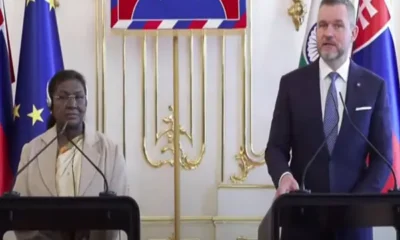

Slovakia ‘fully’ backs India’s bid to become new permanent member of UNSC


Tariff war could reduce US-China goods trade by 80% – WTO DG, Okonjo-Iweala
Columns
CHALLENGES OF TERRORISM REQUIRES HOLISTIC AND MULTIFACETED APPROACH- SENATOR GAIDAM
Published
12 hours agoon
April 10, 2025By
Ekwutos Blog
The Honourable Minister of Police Affairs, Senator Ibrahim Gaidam has pointed out that addressing the challenge of terrorism requires a holistic and multifaceted approach among the security agencies
He stated this during the Stakeholders Conference on Security with a theme “A Path to Regional Cooperation” organized by the Ministry of Police Affairs in conjunction with the Nigeria Police Force and National Central Bureau (NCB) at the Rockview Hotels, Abuja.
Gaidam stated that implementing the International Standard and good practice of sound, modern, integrated, and cooperative border management will go a long way in putting an end to this threat.
He urged all stakeholders present at the conference to work collaboratively towards a shared vision of security. “We can overcome these challenges and emerge as a beacon of stability and progress in Africa if all hands are put on deck”. Gaidam stressed.
The Minister opined that the objective of this conference is to deliberate on the way forward to achieving a stable regional security thereby focusing on strategies to strengthen collaboration among Interpol member countries in West Africa with a view to fostering partnerships to share intelligence, expertise and approaches for combating trans-border crimes.
In his words, “Ladies and gentlemen, it is pertinent to state that the administration of President Bola Ahmed Tinubu GCFR has worked immensely to curb the insurgency caused by Boko Haram, Bandits and other transnational crimes. Some of these measures include biometric system at border checkpoint, integration of data analytics into border security operations and deployment of surveillance drones along critical border regions”.
Gaidam observed that despite Government’s efforts to end the menace of terrorism and violent extremism in the country, the threat posed by terrorism has risen significantly adding that Nigeria was ranked 6th most impacted country globally according to the 2024 Global Terrorism Index.
He enumerated Government to mitigating insecurity which include deploying the military, cooperating with international partners, implementing counter-terrorism legislation; adoption of a legal framework related to the West African Police Information System (WAPIS); provision of (WAPIS) terminals to allow security agencies access to critical information and Establishment of National Criminal Data Fusion Center (NCDFC) for the Nigerian Police Force.
In his goodwill message the Chairman Police Service Commission, DIG Hashimu Salisu (RTD) represented by Director Police Discipline, Ferdinand Uchechukwu Ekpe, stated that no nation can afford to stand alone in the face of threats and insurgency, noting that a secure and peaceful Nigerian state is necessary for a secure and prosperous West Africa and the entire ECOWAS market area.
Also, the Chairman, National Drug Law Enforcement Agency (NDLEA) Brigadier General Mohammed Buba Marwa (RTD) represented by Director Intelligence Kennedy Zirangey in his good will message states that, the conference came at the right time where the nation is faced with insecurity such as terrorism, banditry, insurgency, kidnapping, community conflicts and myriads of other security challenges adding that all the catalyst behind these insecurity threats is drug usage by the foot soldiers perpetrating these crimes.
Earlier, the Inspector General of Police, Kayode Adeolu, represented by Deputy Inspector General Logistics and Supplies DIG A. A. Hamzat, said that the convergence of illicit drugs, small arms, and light weapons in the hands of criminal elements continues to fuel organized crime and extremism, adding that weak border enforcement mechanisms. Fragmented intelligence sharing systems exacerbate the situation.
Columns
Trump’s tariffs: Why won’t countries buy US meat products?
Published
1 day agoon
April 9, 2025By
Ekwutos Blog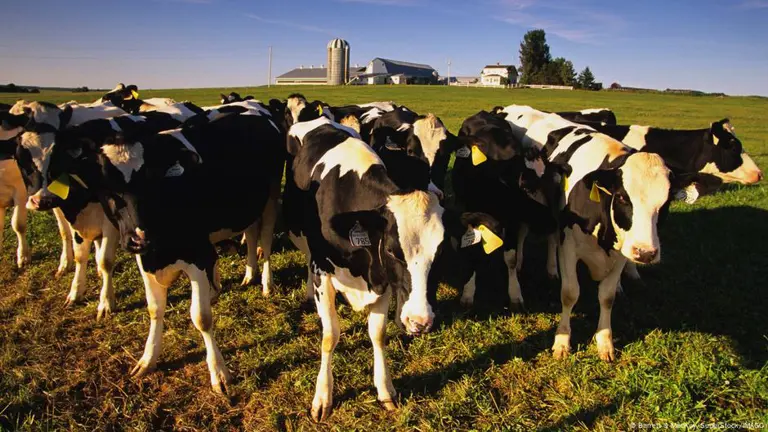
US President Donald Trump wants other countries to import more American beef and poultry. Several countries restrict importing these products for decades because they don’t meet their food safety regulations.
In an announcement on April 2, Trump called out Australian restrictions on US beef, saying: “We imported $3 billion of Australian beef from them just last year alone. They won’t take any of our beef.”
His administration also singled out the UK and EU for “non-science-based” restrictions on importing US beef, and Argentina for its ban of live US cattle exports.
Trump has used these import bans as part of his rationale to impose new trade tariffs.
Who do countries ban US beef imports?
There are different reasons why Australia, Argentina, the EU and the UK don’t import some American beef products.
For Australia and Argentina, the restrictions date back to 2003 when bovine spongiform encephalopathy (BSE) was detected in US cattle. BSE is a disease which affects the nervous system of cattle caused by misfolded proteins known as prions. It’s also known as Mad Cow Disease.
Humans can become infected with the disease when they eat meat contaminated with BSE. It is known as Creutzfeldt-Jakob disease in humans. Globally, a total of 233 people have died from Creutzfeldt-Jakob disease after eating BSE-infected.
US health authorities reduced the spread of BSE among US cattle sufficiently to see the ban on beef exports to Australia lifted in 2019.
“There may be a feeling from some producers or companies in the US that Australia is banning US beef, but there’s no ban in place,” said Robyn Alders, a veterinary scientist at the Australian National University.
But US imports are still restricted if they don’t meet Australia’s strict biosecurity laws. For US beef to be allowed into Australia, US cattle farmers must prove their cattle are entirely bred, grown and slaughtered in the US.
“To do that [tracing] in a way that would still make their product a cost-efficient thing to ship that product across to Australia, there are very few companies — virtually none at the moment — that are willing to take that on,” Alders said.
Argentina lifted its BSE ban on American beef products in 2018 but has maintained the restriction on live cattle imports until the two countries finalize a new “sanitary certificate”.
No added hormones for Europe and the UK
The EU and UK have restricted US beef imports since 1989 because the US cattle industry sometimes uses growth hormones to increase meat and milk yields. The EU does import non-hormone-treated beef from the US.
US dairy and cattle farmers routinely use hormones like estradiol 17ß and testosterone to promote faster growth and improve feed efficiency.
The EU’s ban rationale, which is also maintained by the UK post-Brexit, is based on its own scientific evaluation showing that daily intake of growth hormones can have negative health impacts, including evidence that estradiol 17ß can cause cancerous tumor growth.
The US cattle industry has argued against the EU’s restrictions, saying food safety testing in the US shows no risk to adult health.
“[However], the European perspective is that the entire population does not consist only of health adults, but [also] of infants, children, the elderly, the immunologically compromised,” said Erik Millstone, an expert in food and science policy at the University of Sussex, UK.
“EU authorities have done a much more comprehensive assessment of the risk of consuming hormone-treated beef [compared to US authorities],” Millstone said.
Chlorinated chicken banned in Europe too
The US has also criticized EU bans on importing US poultry that has been cleaned in chlorine.
US poultry farmers wash poultry meat in chlorine solutions to kill harmful bacteria such as campylobacter, which commonly causes food poisoning.
The European Food Safety Authority (EFSA) has said that chemical substances in poultry meat are unlikely to pose a health risk for consumers.
However, European authorities are concerned that rinsing chicken in chlorine at the end of the food production process allows lower standards of hygiene and animal welfare in earlier stages. EU regulations legislate animal welfare at all stages of the “farm to fork” process.
Millstone also that some research shows that chlorine rinsing may not actually have the intended effect of decontaminating meat.
“The chlorinated water was not an effective disinfectant. The bacteria remained in place, remained pathogenic, remained dangerous, infectious, but were just not detected,” Millstone said.
As a result, rates of bacterial food poisoning in the US are substantially higher than they are in the European Union or UK, said Millstone.
What do US producers need to do?
For the time being, US animal farming practices are either incompatible or too impractical to meet the food safety demands of export markets.
Australia and Argentina are open to importing US beef, but US producers must meet their regulatory standards.
For the UK and EU, it’s a more difficult path, which would require US producers to cease using growth hormones in beef production and end the practice of chlorine washing in poultry.
Polling data suggest Europeans are against allowing US meat products in — a 2020 poll found 80 per cent of the British public are against allowing imports of chlorinated chicken.
Columns
Afghan’s claim he is 140 years old is investigated by the Taliban
Published
6 days agoon
April 4, 2025By
Ekwutos Blog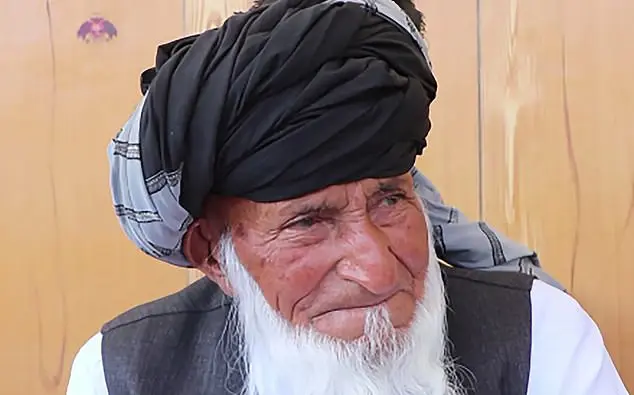
The Taliban is investigating an Afghan man’s claim that he is 140 years old – which would make him the oldest person ever to have lived.
Aqel Nazir, who lives in the country’s eastern Khost province, says he was born in the 1880s.
He claims to remember celebrating the end of the Third Anglo-Afghan War in 1919 alongside King Amanullah Khan, the Afghan leader who launched a campaign against the British, while in his thirties.
Nazir, who lives in the picturesque hills in Khost, said: ‘I was in the palace with King Amanullah Khan.
‘I was over 30 at the time and I remember saying that the British had fled and knelt down.
‘Everyone was happy and thanked King Amanullah Khan for chasing the British away.
‘Many leaders accompanied us to the Arg [presidential palace], but now all of them have passed away.’
The great-great grandfather does not have any documents to support his claim, but his family are also on board with gaining official recognition of his status.
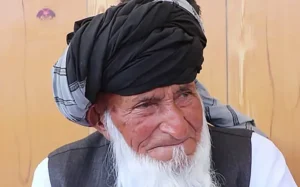
Aqel Nazir, who lives in the country’s eastern Khost province, says he was born in the 1880s

The ruling Taliban administration has dispatched a a special civil registration team to assess his true age
Khyal Wazir, his 50-year-old grandson, said: ‘He is my grandfather, and I have my grandchildren as well.’
Another grandson, Abdul Hakim Sabari, said: ‘We request the government confirm our grandfather’s age using an ID or any other scientific method or documents, to prove he is 140 years old.’
In an attempt to solve the mystery, the ruling Taliban administration has dispatched a a special civil registration team to assess his true age.
Mustaghfar Gurbaz, a Taliban spokesman for the province, said: ‘If confirmed by documents or assessments, we will work to register him as the oldest person in the world.’
If verified, he would comfortably take the title of the oldest person to have ever lived.
That record is held by Jeanne Calment, who was born in 1875 and passed away in 1997, 122 years later.
The world’s current verified oldest living person is Inah Canabarro Lucas, a Brazilian nun who turned 116 last June.
Another Brazilian woman, Deolira Gliceria Pedro da Silva, is hoping to have her own claim to be 120 years of age verified by Guinness World Records.
But experts have already cast doubt on Nazir’s claims.
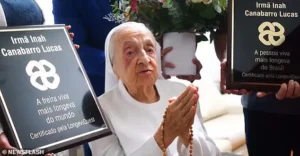
The world’s current verified oldest living person is Inah Canabarro Lucas

The Brazilian nun turned 116 last June
Valery Novoselov, a geriatrician at Moscow State University, told Russian outlet AIF: ‘There are no reliably registered men on the planet older than 114 to 115 years [of age].
‘In the Caucasus in the 60s, they also recorded “long-livers” – shepherds who allegedly lived to 168 years.
‘These are so-called games with age. There are no documents, no reliable data – which means this is an unrealistic picture.’
In 2015, a man claiming to be 100 years old applied for asylum in Germany after an extraordinary eight-month journey from Afghanistan.
Like Nazir, Abdul Qadir Azizi did not have any identity papers, but his family claimed his year of birth was 1905.
Azizi, who is deaf and blind, spent one month travelling across two continents from his home in the Afghan town of Baghlan to reach Germany.
His family fled after three of Azizi’s sons were killed by the Taliban.
The plight of the elderly in Afghanistan has worsened since the Taliban takeover.
In 2024, they effectively abolished the pension system, leaving many older Afghans struggling to meet basic needs.
Previously, anyone over the age of 65 received a monthly payment of around $100 from the state.

COURT IN ANAMBRA, GRANTS MOTHER CUSTODY OF HER THREE CHILDREN, ORDERS HUSBAND TO PAY WIFE 150k EVERY MONTH FOR UPKEEP.

Police arrest nine suspects over killing of septuagenarian in Oyo community

Wike using his influence to undermine democracy in Rivers – CHRICED
Trending

 Trending6 months ago
Trending6 months agoNYA demands release of ‘abducted’ Imo chairman, preaches good governance
- Business6 months ago
US court acquits Air Peace boss, slams Mayfield $4000 fine

 Politics6 months ago
Politics6 months agoMexico’s new president causes concern just weeks before the US elections
- Entertainment6 months ago
Bobrisky transferred from Immigration to FCID, spends night behind bars
- Entertainment6 months ago
Bobrisky falls ill in police custody, rushed to hospital

 Politics6 months ago
Politics6 months agoRussia bans imports of agro-products from Kazakhstan after refusal to join BRICS

 Politics6 months ago
Politics6 months agoPutin invites 20 world leaders
- Politics1 year ago
Nigerian Senate passes Bill seeking the establishment of the South East Development Commission.

